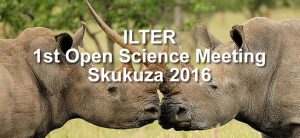
Interest in the opportunity was extraordinarily high, with more than 60 requests to support travel to the meeting and only 24 slots available. The funding process aimed to prioritize opportunities to build international collaboration, while being inclusive of early career researchers and distributing funds broadly across the network.
The Network Communications Office congratulates the following investigators, who will receive travel support for the ILTER meeting, scheduled for October 9-14, 2016.
- Christie Bahlai, Research Associate, Michigan State University, and Mozilla Science Fellow, KBS
Project-based training in reproducible research using population data produced by LTER sites - Becky Ball, Assistant Professor, Arizona State University, CAP
The impacts of urbanization on soil biogeochemistry and biodiversity in the Sonoran Desert - Jeff Bowman, Postdoctoral Fellow, PAL
Methods to assess and monitor marine ecosystem services in the Palmer LTER: A high latitude coastal environment in rapid transition - Deron Burkepile, Associate Professor, UC Santa Barbara, MCR
Impact of nutrient pollution on coral bleaching, coral mortality, and coral recovery in the Moorea Coral Reef LTER - Jessica Corman, Postdoctoral Research Associate, NTL
From whence the carbon: Potential effects of acid rain and climate change on staining in lakes in Wisconsin, USA - Marty Downs, Lead Communications Officer, NCO
Supporting Collaboration with Effective Communication: The USLTER Network Communication Office - Michael Duniway, Research Ecologist & Soil Scientist, USGS, JRN
Soil water, drought, and the heterogeneous vulnerability of dryland ecosystems - Michael Gooseff, Associate Professor, University of Colorado, Boulder, MCM
Long-term response to climate variability in aquatic and terrestrial ecosystems - Lauren Hallett, Postdoctoral Researcher, NWT
Spatial heterogeneity buffers species diversity to climate change: Evidence from long-term population dynamics in an alpine grassland - Charles Hopkinson, Professor, University of Georgia, GCE
Sustainability of coastal wetlands in light of climate change, land-use change and sea-level rise - Forest Isbell, Adjunct Assistant Professor, University of Minnesota, CDR
Biodiversity increases the resistance of ecosystem productivity to climate extremes - Gary Kofinas, Professor, University of Alaska, Fairbanks, BNZ
Local and Traditional Knowledge in Long Term Ecological Research: Methods, Integration, and Policy Relevance - John Kominoski, Assistant Professor, Florida International University, FCE
Understanding the biogeochemical consequences of saltwater intrusion among coastal wetlands: linking freshwater availability, nutrient limitation, and carbon storage - William McDowell, Professor, University of New Hampshire, US International LTER co-chair, LUQ
International LTER and CZO networks: Opportunities to build a global understanding of land-water linkages - Bonnie McGill, 4th year PhD candidate, Kansas State University, KBS
Agricultural liming, groundwater irrigation and carbon sequestration - Karen McGlathery, Professor, University of Virginia, VCR
Climate change affects coastal habitat resilience and carbon sequestration - Robert Miller, Associate Research Biologist, UC Santa Barbara, SBC
Responses of biodiversity to fluctuations in foundation species - James Morris, Professor, University of South Carolina, PIE
The Strange Harmonics of Salt Marsh Biogeochemical Cycles in 4D- With a Twist: It’s a Symphony - Mark Schildauer, Director of Computing, NCEAS, NCO
Construction and Use of ECSO: A Formal Vocabulary for Describing and Defining
Ecosystem Concepts
The Data Observation Network for Earth, DataONE: a distributed framework for
preserving and discovering data about earth and environmental observations - Gaius Shaver, Senior Scientist, The Ecosystems Canter, ARC
Carbon balance, leaf traits, and canopy structure in heterogeneous arctic vegetation - Christopher Still, Associate Professor, Oregon State University, AND
Thermal Imaging of Ecosystem Temperatures: Relationships with Biological and Biophysical Drivers and Ecosystem Fluxes - Jonathan Thompson, Senior Ecologist, Harvard Forest, HFR
Land-use scenarios and their impacts on ecosystem services - Tiffany Troxler , Research Associate Professor, Florida International University FCE, ILTER Executive Board
Carbon and water cycles under climate change - Robert Waide, Professor, University of New Mexico, LUQ
Food web dynamics across the LTER network as a model for a broader scale comparative study across a network of international sites - Lydia Zeglin, Assistant Professor, Kansas State University, KNZ
Microbial feedbacks to soil N availability in tallgrass prairie following 30-year burning and fertilization treatments










